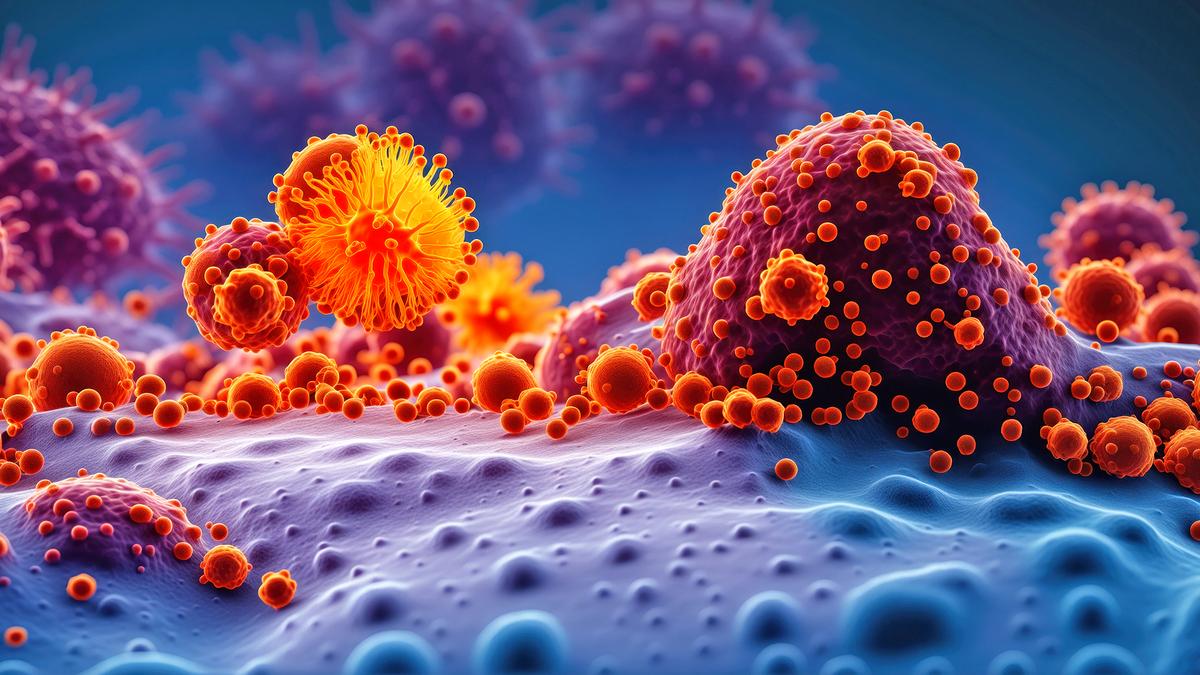
Using the body’s own defences to fight cancer: new research offers a clue from COVID-19 Premium
The Hindu
New research shows white blood cells activated by COVID-19 may have cancer-fighting abilities, offering hope for future treatments.
Cancer, often called the “emperor of all maladies,” remains a formidable adversary despite decades of scientific progress. However, research in recent years has brought us closer to unlocking new ways to combat it. A study from Northwestern University in Chicago, published in the November issue of The Journal of Clinical Investigation, has gained attention for discovering that white blood cells activated by severe COVID-19 demonstrate cancer-fighting abilities.
Working with laboratory mice, researchers showed that the spread of cancer, also known as metastasis, could be slowed by a specialised type of white blood cell called induced non-classical monocytes (I-NCMs). These cells can be generated through severe infections like COVID-19 or by using certain chemicals. Once activated, I-NCMs are able to leave blood vessels and migrate to tumours, where they launch an attack on cancer cells. COVID-19 is known to cause worse outcomes for older individuals and those weakened by ailments including cancer. However, there are rare reports of cancer going into remission (absence of disease) following COVID-19.
A 2023 study by De Nigris and colleagues in the Journal of Translational Medicine described 16 such cases involving different types of cancer, including leukemia, lymphoma, myeloma, and kidney cancer. However, it is unclear if these outcomes were directly caused by COVID-19 or were part of the natural progression of the disease. This raises the question: Can cancers go away on their own? While extremely rare, the answer is yes. The most well-studied example is neuroblastoma, a rare childhood tumour that occasionally disappears without treatment. Such spontaneous improvement may be due to a newly-activated immune system gaining the ability to target cancer cells.
Over the past decade, immunotherapy has emerged as a promising approach to cancer treatment.
Broadly speaking, cancer is a rogue colony of body cells that grow uncontrollably, feed on the body’s resources, and spread to other parts of the body through the bloodstream. Cancer cells often reprogramme the body’s immune system to protect themselves from detection and destruction, much like a thief bribing a security guard to look the other way. Immunotherapy aims to overcome these defences by empowering the body’s immune cells to fight back. The Northwestern University research showed that injecting a specific type of white blood cell, I-NCMs, into mice was effective in combating cancer metastasis.
I-NCMs are derived from monocytes which circulate in the bloodstream. Monocytes are involved with fighting off infections, immune regulation and repairing damaged tissue. When exposed to certain bacterial or viral infections or chemicals, a small number of these monocytes transform into I-NCMs. If white blood cells represent all adults in a town and monocytes are those who made it to military selection, think of I-NCM’s as the select few from the military who qualified for a specialised commando unit.
Unlike regular monocytes, I-NCMs possess a unique receptor, CCR2, which acts like a specialised antenna to detect signals emitted by certain types of cancer cells or inflamed tissues. These signals guide I-NCMs to the source, where they perform specific tasks. For example, at an infection site, they help eliminate pathogens. At a tumour site, they recruit other immune cells called natural killer (NK) cells, which are effective at destroying cancer cells. Natural killer cells are a vital component of the immune system, directly targeting and eliminating abnormal-appearing cells, such as cancer cells or virus-infected cells. Unlike T cells and B cells, natural killer cells do not require prior approval from the body’s adaptive immune system. This ability to act swiftly and assertively makes them a critical part of the body’s innate immunity. They work as frontline defenders against infections and cancer.

Podcasts have become our best friends, especially during the Covid-19 pandemic. Whether you are cooking, sketching or going on an evening walk, there is a show that matches your mood. From horror tales to informative conversations to just two friends talking about anything & everything relatable, podcasts have become a part of our lives unknowingly. Over the years, more voices have joined this audio landscape and filled it with stories that resonate with our lives. Podcasts serve as a reminder that everyone has a story worth telling and listening to!










